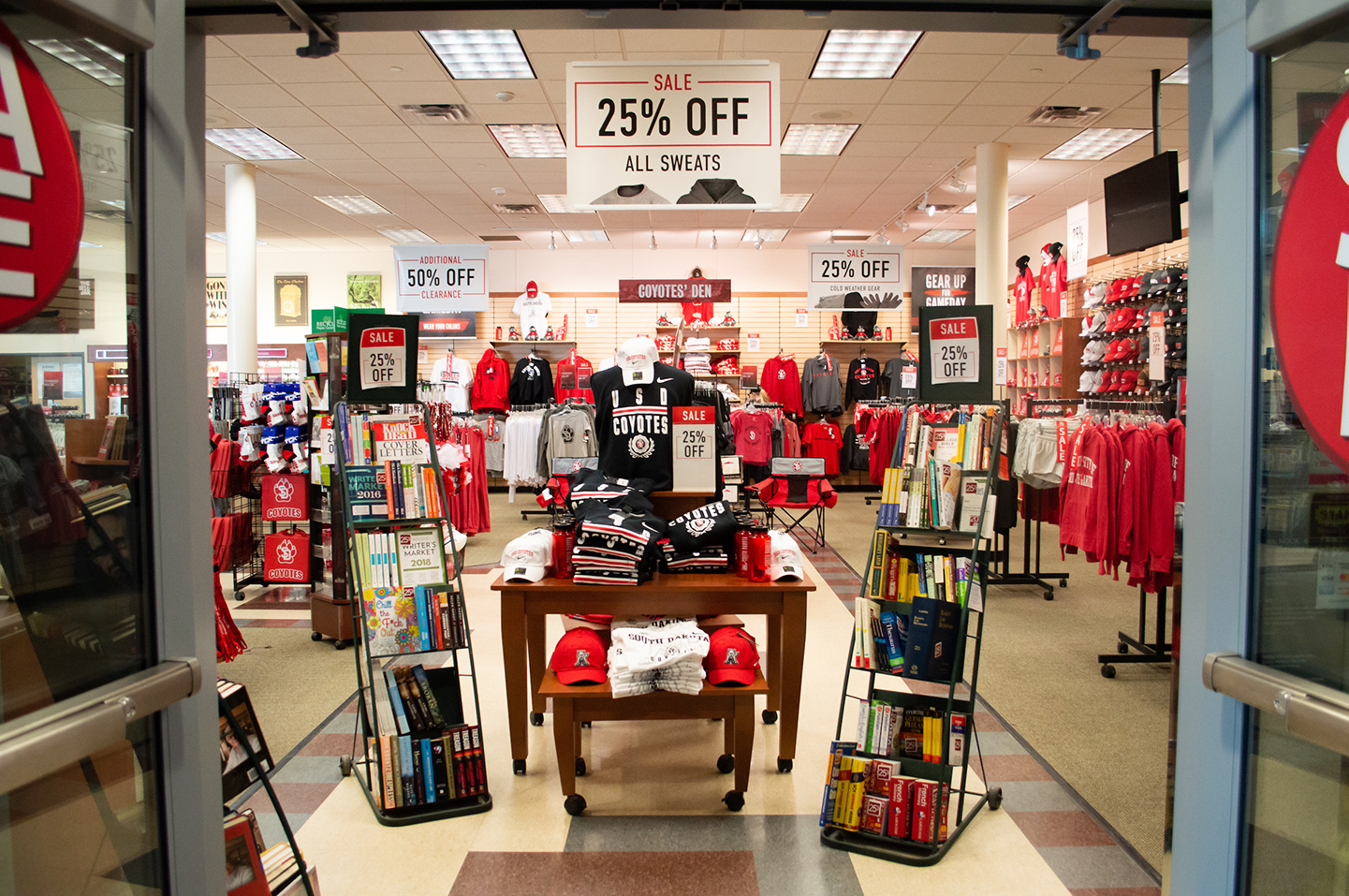
USD bookstore bypasses contract renewal with Barnes & Noble, will convert to online platform
USD will implement a new online bookstore through a platform called Akademos, ending a 17-year partnership with Barnes & Noble, beginning June 1.
Charlie’s, USD’s retail store, will replace Barnes & Noble’s current space in the Muenster University Center with a second location. Charlie’s will still sell basic student supplies, but if students opt to order textbooks and course materials through the university, they must use do so online using usd.textbookx.com.
“They are going to facilitate how faculty adopt books and then how students buy books. That will all be done online in partnership with Charlie’s,” Scott Pohlson, VP of Marketing, Enrollment and University Relations, said.
According to University Relations, the online bookstore will offer “real-time pricing,” a “peer-to-peer marketplace” where students can buy and sell textbooks, free shipping on orders over $49 and a “course page showing only the courses students are registered for with all corresponding materials.”
Rentals and used textbooks will still be available to students through the online bookstore. Students can also deliver their books to Charlie’s for pick-up.
A committee comprised of students, staff, faculty and administration decided to transfer the bookstore online after evaluating the future of the market and its attraction to digital bookstore vendors, which Pohlson said were the university’s main competition.
“The question that we had, and this is the number one decision-making factor for us, was ‘what does the bookstore market look like in three years, five years down the road?’” he said. “Our feeling was that it will look different. We tried to look at it in a future setting to try and be proactive about where the market was going.”
Barnes & Noble has been USD’s vendor since 2002. Their latest contract expires at the end of June. Earlier this year, the committee sent requests for proposal (RFP) to four different vendors: Barnes & Nobles, Akademos, Follett and BBA solutions. USD’s contract with Akademos will span for three years with an option to renew after.
A few USD professors, including economics professor Kathy Birkeland and biology professor Andrea Liebl, said they don’t believe the shift to an online bookstore platform will drastically change the way students buy books.
“For my face-to-face classes, I think there are some students who will miss being able to go pick up their book, but I think a fair number of them order them online already because they can find it cheaper than they can find it here,” Birkeland said. “At first glance, it may mean that we don’t do a whole lot with the book that first week because we’re waiting for students to make sure they have them, but we have that problem with the bookstore anyway because they didn’t always have the books in stock.”
Liebl said it could affect students who wait until the last minute to buy textbooks for classes.
“I feel like that’s going to problematic only for students who— it’s probably a lot of students— who don’t think about things ahead of time. Or if you change your mind or register for a class last minute or something like that,” she said.
Alyssa Bossman, a sophomore business major, said she likes the immediate availability of books Barnes & Noble does have in stock.
“I like that you can go in to pick it up. If it’s online, you have to wait for it to come in,” she said. “Usually, I go to my classes for a week, and then if I really have to get the book, I’ll just walk into the bookstore and say ‘hey, do you have this book?’ and walk out with the book.”
Shipping windows may cause issues for students at the beginning of each new semester, but the conversion may bring financial benefits. The administration aimed to handle textbook distribution internally rather than paying out “big bookstore vendors,” which Pohlson said will funnel money back to students in the form of scholarships.
“All the other Board of Regents schools in South Dakota do it on their own. It’s not a new thing for everyone else, it’s just a new thing for us,” he said. “The opportunity, which is also the concern, is students and faculty being on the same page about ‘hey, we can do this ourselves, and in the end, it will actually benefit students, but we have to be willing to go through that new process.’”
After deciding to go online, the committee then leveled whether or not Charlie’s was in a position to expand to an on-campus store.
“If they could do that, we were comfortable with having just an online bookstore,” Pohlson said. “We’ll be hiring students, hiring different managers. One of them is already out there— a Director of Bookstore and Retail Operation out on the employment website.”
The move will not displace students and other workers from their current jobs at Barnes & Noble; they can choose to continue working in the same location for Charlie’s.
Pohlson said the transition will involve a few kinks, but if the campus community invests into the online bookstore and Charlie’s, those profits will make up for cheaper textbooks.
“It’s going to be a process. It will happen overnight, literally. Everybody’s going to have to be involved in moving this forward,” Pohlson said. “At the same time ‘hey, come and buy your books from USD and Charlie’s, because we’re going to put those funds into scholarships for students as opposed to sending it to a big vendor.’ We’re Coyotes, we think we can do this.”
Barnes & Noble managers and staff denied to comment on the matter.

